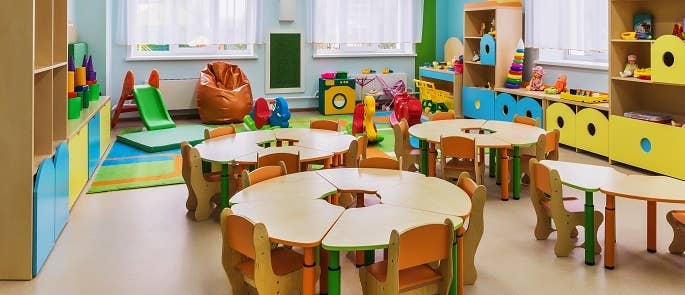How to Start a Nursery Business
Nurseries are popular, successful businesses in this day and age. They offer early childhood education to children before they begin compulsory education, and could be the perfect place for you if you enjoy working with children. However, if you’re thinking of starting your own nursery school, there’s a lot that needs to be taken into consideration first.
In this guide, we will cover everything you need to know about starting a nursery business, including the qualifications required. We’ll also provide a free business plan template that you can use.
The contents of the guide are as follows:
- Why Start a Nursery Business?
- Starting a Nursery Business Plan – Market Research, Choosing Your Premises, Financial Planning, Marketing and Branding
- What Qualifications Do I Need to Open a Nursery?
- How Do I Run a Good Nursery Business?

Why Start a Nursery Business?
Starting your own nursery business can be extremely rewarding – the benefits include:
- The ability to influence and be involved in children’s early development, which lays down the foundations for the rest of their lives. Early years are really important – find out more in our article here – and helping to give children the best start makes for a fulfilling career.
- High demand and the potential for great success. The Department for Education’s 2019 report showed that there were 1.7 million childcare places offered in that year in England, with the great majority being from group-based nurseries rather than school-based ones. Few places go spare – only 19% of group-based nurseries’ places were available in 2019 – because more parents are able to work, as a result of changes in employment conditions, and new government childcare schemes.
- Freedom to work for yourself. Starting your own nursery gives you the freedom to be your own boss, and if you decide to do it from home, you don’t even have the hassle of travelling.

However, there may be some drawbacks to consider. Like any start-up business, there are risks to starting a nursery: you need a really good business plan, great organisational skills, and a passion for the industry. Additionally, you have to be prepared for things to go wrong – insurance policies are particularly important, so that you don’t find yourself on the wrong end of a lawsuit.
Back to TopWhat Qualifications Do I Need to Open a Nursery?
If you plan to set up a nursery business, you don’t need any formal childcare qualifications, unless you want to be involved in the day-to-day managing of the nursery. Managers must have at least two years’ experience as a qualified nursery nurse, one to two years’ experience in a supervisory role, and a relevant nursery qualification.
However, there are a lot of other considerations that you will need to keep in mind, from registering your nursery to safeguarding requirements and health and safety regulations.

Registering Your Nursery
Your nursery will need to be registered the specific regulator in your country:
- England – Ofsted. Follow the link to this page for more information.
- Wales – CSSIW (Care and Social Services Inspectorate Wales). Look at this page for more information.
- Scotland – the Care Inspectorate. Follow this link for more information.
- Northern Ireland – the Health and Social Services Board (HSSB). Follow the link to this page for more information.
In order to apply for registration, you must be aged 18 years or older, have the right to work in the UK, and must undergo a Disclosure and Barring Services (DBS) check. The DBS check ensures that you have no criminal convictions that make you unsuitable to work with children; it costs around £50. You will also need to fill in a health declaration booklet, detailing any health problems that you have and any medication you are taking.
Once you are registered with Ofsted, they will carry out inspections of your nursery at least once every three years, to ensure that it conforms with the 14 national standards for childcare. You will be graded on this.
Below is an overview of the relevant information contained in the 14 national standards.

Safeguarding
You must comply with local child protection procedures, and ensure that all staff are also aware of how to safeguard effectively – including the symptoms of children at risk, and what to do to report it. You will also need to create a written procedure detailing what to do if allegations are made against a member of staff, as well as the person in your organisation that everyone with concerns should go to. Additionally, you should have a system of attendance showing the times of arrival and departure of every child at nursery, and a system where you can identify that children are being collected by the correct person.
Need Safeguarding Training?
You and your nursery staff will need at least Level 1 Safeguarding – our Safeguarding Children in Education course will provide you with the knowledge and skills you need. We also offer higher-level safeguarding training, including Advanced Safeguarding Children (Level 2) and Designated Safeguarding Lead Training (Level 3) – visit our safeguarding course library to browse our available courses.
Health and Safety
You will need to complete a risk assessment of your premises, and ensure that you review it if there are any significant changes or you have reason to suspect it is no longer valid. Your risk assessment will need to include an action plan to identify how and when you will minimise any existing risks. For help completing your risk assessment, have a look at our Health and Safety in Schools Checklist – much of this information will also apply to you.
Additionally, it’s really important that all your staff know what to do in an emergency. This includes fire safety measures and evacuation procedures, how to report injuries, how and when to administer medicine, how to handle hazardous substances, and how to carry out manual handling. At least one staff member on the premises must have paediatric first aid training at all times.
You will require policies about health and safety and ill or infectious children, and a procedure for what to do if a child becomes ill while they are at nursery. You should also have a no smoking policy.

Food Safety
If you will be preparing food and drink for children in your nursery, you will require appropriate training – there must be one trained member of staff on duty at all times. A Level 2 Food Hygiene course would be an appropriate qualification. All other members of staff must ensure that they also follow safe food hygiene practices; you should create a food hygiene policy with sections covering everything they need to know, from cross-contamination to temperature control and accidents. Don’t forget about allergens – we have created a handy poster of the 14 named allergens that you could give to staff:
Documentation
You will need to ensure that you keep records relating to the children you care for – these must cover everything that your staff need to know in order to safely and effectively care for each child. After a child has left your nursery, you will still need to keep these records for a reasonable period of time (PACEY recommends this to be six years after the child has left your setting).
When handling records, you will need to follow data protection regulations. Failing to comply with data protection law can lead to serious consequences. If you need training in this, have a look at our Data Protection for Schools course.

Equal Opportunities
All staff must actively promote equality of opportunity and anti-discriminatory practices. You will need an equal opportunities policy that follows the current legislation and guidance on the topic – take our Equality & Diversity Training to update your knowledge. Your equal opportunities policy should be available to all staff and parents.
For more information about the 14 national standards, have a look at the Department for Education’s guidance. If you will be looking after babies, there are additional criteria in that document which will apply to you.
Back to TopStarting a Nursery Business Plan
When setting up a nursery, the first thing you need to do is create a business plan. This will help you to stay on track and within budget, as well as showing any prospective lenders that you know what you’re doing.
In this section, we will detail everything you need to think about and consider including in your business plan. We will also provide a business plan template for you to fill in.
Need More Help to Start Your Business?
If you need more help to write your business plan, and you could do with advice on finding investors, accessing support, marketing and operations, try our Starting a Business course. Once you complete the training, you’ll be confident and prepared to set up and run your nursery business.
Market Research
One of the first things to think about is whether there is actually demand for a nursery in your local area. Look at the childcare providers around you which might be your competition, including other nurseries and childminders. How many of them are there? Are they full, or do they have lots of spare places?
An easy way to find this information out is through your local authority, which will have a list of all registered childcare providers. You could also contact the other providers to ask whether they are over-subscribed. If the market is already saturated in your area – in other words, if there are already plenty of nurseries, with plenty of places – then starting your own may not be such a viable plan.

Other things you should consider are the services the existing nurseries offer, and what their fees are. This will give you guidance as to what you could provide, and for how much: if their service is limited in some way, could you be more flexible? Think about the length of their opening hours, the ages they provide for, group sizes, and activities – for example, could you offer regular trips to the park, or foreign language lessons? Could you cater for broader age ranges? You could ask your friends, family, and acquaintances what they would like in a nursery, or even contact the local authority about what provision they feel is lacking.
In terms of fees, you need to think about how many parents in your target market will be relying on government support or subsidies – research the average wage and other demographics in your area, and think about whether you would register your nursery for the Tax-Free Childcare Scheme, or make your fees reasonable for those paying individually.
Choosing Your Premises
The premises you run your nursery from can hugely influence its appeal to your target market. Initially, you should decide whether you want to run the business from your home, or whether you will acquire new premises.
Running a Nursery from Home
You can run a nursery in your home if planning permission is granted – you will need to contact your local authority about this, and it may take some time. If you decide to do so, be aware that the minimum space requirements set by the government might limit your capacity: you need 3.5 square metres per child under two years old, 2.5 square metres per child aged two years, and 2.3 square metres for children aged three to seven.

Acquiring Other Premises
If you decide to acquire other premises, consider:
- Location: whether the venue is in an area that covers your target market. Are there plenty of family homes and lots of schools? Is it an area where parents will be able to afford your fees, or access them with subsidies? Are there lots of other nurseries nearby, and are these already full or not?
- Access: is there parking outside or nearby, for both staff and parents? What are the transport links like – is there a nearby bus stop or train station? Are there pedestrian crossings so that parents can cross the road safely and easily?
- Outdoor facilities: is there enough space outside for a playground? Can the grounds be enclosed, so that they are safe?
- Indoor facilities: is there the potential to install all the necessary facilities, including toilets (one for every 10 children over the age of 2), kitchen facilities, changing areas, and a telephone? Is the building well-lit and adequately ventilated? Is there enough space to have separate areas for all the activities you plan to run, as well as for storage for equipment?
- Potential hazards: are there multiple floors? Are staircases child-friendly? Would you be able to prevent children from accessing the kitchen?
- Future expansion: is there scope for expansion in the future?
You might decide to convert a building into a nursery, purchase an existing nursery building, or share space with a building such as a retirement home or indoor play centre (something that is becoming popular!). If you choose to share space, bear in mind that this might limit your ability to be flexible in opening hours and expand your business.

Financial Planning
Financial planning is key to any successful start-up. You will need to spend time working out each of the following:
Costs
You will have two types of costs: start-up and running. Your start-up costs involve:
- Setting the nursery up, including buying the premises (if you choose to do so), and any building conversion costs.
- Installing facilities such as a professional kitchen and outdoor play equipment/ground surfacing.
- Buying furniture, toys, books, first aid kits, office equipment, uniforms, and signage.
- Registering your nursery.
- Marketing.
- Initial staff training.
Start-up costs could total up to £100,000, but you could cut costs by buying things second-hand, doing as much as you can yourself, or deciding to be part of an existing nursery franchise.
Running costs will include ongoing expenses, such as:
- Rent or mortgage payments.
- Staff wages. The average salary for nursery staff is £19,000; paying their wages will make up the bulk of your running costs.
- Your own salary.
- Utilities (including council tax, water, gas, and electricity).
- Food and other disposable resources.
- Cleaning.
- Regular maintenance.
- Ongoing staff training.
- Insurance.

Profit
You need to project how much money you expect to make from your business, in order to find out whether or not it is going to be profitable. First, consider how much you are going to charge by looking at other nurseries’ fees to compare. You might be able to charge more if you are going to offer more services – for example, you could charge extra for snacks, meals, trips out, and other activities. Government childcare payment schemes cover the childcare rather than these extra things, so all parents could be charged for them on top of the regular fees.
Then, think about how many children you will need to have in your care, paying the fees you have decided upon, to be able to cover all your outgoing costs and give you the profit you want. You will need to make a profit for your business to be sustainable. Create a cashflow forecast for the first year of your business, anticipating what money will be coming in. Remember that the number of children in nursery can fluctuate throughout the year, so you might not be able to rely on consistently filled places in every season. Also think about whether you’re going to offer part-time, as well as full-time, places, and the difference in cost between these.
Finally, give some thought to how you’re going to collect your fees from parents. You need to ensure that fees are paid regularly and on time – if lots of parents pay you late, you can easily run out of money. It is best to set up standing orders or direct debits for this reason.

Insurance
Insurance is included in your running costs, and it’s worth mentioning which insurance you should consider acquiring before you start your nursery. This includes:
- Public liability insurance. This covers the cost of potential injury or sickness experienced by a member of the public (such as a child) on your premises – for example, staff administering non-prescribed medication, allergic reactions, and injuries on your play equipment.
- Employer’s liability insurance. This covers the cost of potential injury or sickness experienced by a member of staff while on your premises. You will need to display your certificate of this insurance clearly in your nursery.
- Professional indemnity insurance. This covers you if you give out expert advice to parents or children which turns out to be wrong.
- Commercial property insurance. This covers your property (and potentially the contents of your property) in the event of fire, flood, or theft.
- Business interruption insurance. This pays you a certain amount if your business has to close for a period of time.
- Personal accident cover. If you are heavily involved in the business, personal accident cover is advisable – if you have an accident and can’t work, it will give you financial compensation during this time.
If you plan to organise trips, make sure that your insurance policies cover staff and children when they are away from the nursery premises.

Funding
Looking at all the costs you have in front of you, think about how you’re going to fund the business. You might have your own savings, or the potential of a ‘soft loan’ from family or friends. Your local authority might be able to provide you with some funding – look on their website or get in touch with them for more information. Additionally, you could acquire a loan, whether that is from the government (e.g. The Start Up Loans Company), or from private equity funding sources.
Marketing and Branding
Marketing and branding are important parts of your business plan – they involve making your business known, and giving it its own style.
To create your own professional brand, consider speaking to a branding consultant. They can help you to design your logo, colour scheme, and uniform, along with giving you advice on the way you communicate, and policies. Your brand is important in showing potential customers why they should come to your nursery.

The next step, marketing your business, could involve:
- Placing bold signs outside your premises, so that potential customers in your area notice you.
- Creating a website, which includes your location, contact details, and the services you offer (at the very least). You might be able to create your website for free, but if you want lots of traffic to come to your site, it could be worth talking to an SEO specialist to help you get it listed on major search engines. It could also be worth working with a website designer, if you want to make it look extra professional – they should be able to consider SEO too.
- Using social media accounts, including Facebook, Twitter, and Instagram. This helps to attract new customers – however, remember to get parents’ permission before posting pictures of children.
- Leafleting and hanging banners. These methods are still effective!
- Giving tours of the nursery, or holding an open day. This will create trust between you and your prospective customers, and show off your premises to everyone who is interested.
Marketing is never finished – it is a continuous process, because the children at your nursery will gradually grow up. Make the most of every marketing opportunity.
Now that you know what to write in your business plan, download the template – which you can edit on your computer or print out – using the button below:
How Do I Run a Good Nursery Business?
Now you know what you need to do, you might be wondering what you could do to make your nursery the best that it can be. In this section, we will provide you with some tips and advice for maximising the success of your business.
Choosing the Right Staff
It is extremely important to choose the right staff to work in any business, but particularly when you work with children and families. When choosing your staff, think about:
- Whether they have patience and enjoy working around children. They will be required to do this day in, day out, so it’s key that they have the right attitude and share your vision.
- Whether they are trained in Special Educational Needs and Disabilities (SEND). Some children that pass through your nursery may have special needs, and you will need staff who can adequately provide care to them.
- Whether they can manage behaviour effectively. Those who care for children might experience a wide range of behaviour incidents, and they need to be able to respond in a way that promotes the children’s welfare and development.
- Their qualifications. At least half of your staff will need a Level 2 qualification that is relevant to the care or development of children – or be working towards this – and others should possess Level 3 qualifications. You can use the government tool to check whether someone’s qualifications are applicable to your setting. Additionally, consider taking on apprentices – they will have less experience, but will be rewarding and inexpensive to train.

Keep in mind that there are minimum staffing ratios for nurseries: there must be one adult to every three children under the age of two, 1:4 for those children aged two, and 1:8 for children aged three to seven. Trainees or apprentices under the age of 17 do not count as an adult in your adult to child ratios. There must also be a minimum of two staff on duty at all times.
Pay and Training
Once you have hired your staff, paying them what they are worth and investing in training and development will ensure that you have high staff retention rates, as well as improving the quality of your nursery, morale, and productivity.
While all staff will require induction training within their first week – including safeguarding, food hygiene, and health and safety training – you should also think about courses they could take for their Continuing Professional Development (CPD).
For example, staff who have achieved Level 3 qualifications could be upskilled by completing Level 5 qualifications, allowing them to take on more managerial responsibilities in the nursery. Staff wanting to increase their skills might also take Challenging Behaviour Training. There are plenty of courses related to childcare and other aspects of the work environment that your staff could take, and you should ensure that they do complete extra training every year, as well as keeping on top of their compulsory safety training requirements.

Creating a Good Learning Environment
Your nursery school will not only provide childcare – it should also help children to develop their emotional, physical, social, and intellectual abilities. You should follow the Early Years Foundation Stage (EYFS) development structure, providing activities and play opportunities that support children’s:
- Personal development
- Language and communication
- Mathematical development
- Knowledge and understanding of the world
- Physical development
- Creative development.
You can use the EYFS handbook to help you to meet these goals.
Staff will need to support children in carrying out activities, listening to them and talking about what they are doing. They should also be able to teach children what is right and wrong, and encourage positive behaviour – for tips about how to do this in the early years, read our article.
In addition, you should have furniture, equipment, books, and toys that help to make your nursery an accessible and stimulating environment.

Working in Partnership with Parents and Carers
Finally, you can make sure you are running a good nursery business by working with parents and carers to meet children’s needs as best you can. This involves sharing relevant information with them, having an established complaints procedure, and valuing their feedback and opinions on your nursery. By building trust between you, you can ensure that they are satisfied, and your reputation will be great as a result.
Back to TopWe hope you’ve found our guidance on how to start a nursery business helpful, and we wish you luck if you plan to get started. If you need further information, don’t hesitate to get in touch with us to see how we could help – you might also find the range of courses we offer, alongside our other resources on the Hub, of use.
Further Resources:
- Education Training Courses
- How to Become an Early Years Practitioner
- Promoting Positive Behaviour in Early Years: A Guide for Nurseries
- How to Become a Childminder in Your Own Home
- Professional Development in Early Years Education
- How To Apply For A DBS Check When You’re Self-Employed











